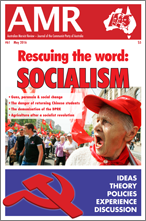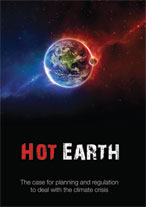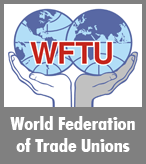We need an active united peace movement
A talk given at the Unitarian Church, Melbourne
I will speak about how the current war system works, the desirability and necessity of replacing it, and how this is possible. Most of you have been involved in activities against wars. It is time to put into practice what our peace and social justice campaigners did from the 1960s to 2010. Learn from our past – from the campaigns run by the peace movement, in particular, by the Campaign for International Cooperation and Disarmament (CICD) during the Vietnam War as part of the worldwide movement that forced this war to stop.

We need to be proactive and have a vision for peace. Wars do not work: they create a state of continuous crisis. In the last 120 years the world has suffered many wars. World War One was justified as the “war to end wars”, but war never brings peace. It may bring a temporary resolution, a desire for revenge, and a new arms race until the next war. Ten million people died in World War One, 50 to 100 million in World War Two.
Weapons of mass destruction could, if used, end civilisation on this planet. Some other wars over this period include: the Spanish American War, the Balkan Wars, the Russian Civil War, the Spanish Civil War, the Korean War, the Vietnam War, wars in Central America, the wars of Yugoslavia, the Iran-Iraq War, the Gulf Wars, the Afghan War, the US Iraq War, the Syrian War ... this by no means is a complete list!
Another intervention I’d like to mention is the 1953 coup d’état against the democratically elected Iranian President Mohammad Mosaddegh, orchestrated by the CIA in conjunction with Britain. The coup was triggered when Mosaddegh demanded an auditing of the books of the Anglo-Iranian Oil Company, a British company known today as BP. Mosaddegh threatened nationalisation when the British refused to allow the audit. He was replaced by the Shah of Iran, who was seen by many Iranians and Arabs as a puppet of the United States.
US military interventions continue in Iraq, Syria, Afghanistan, Pakistan, Somalia and Libya, leaving chaos and millions of refugees fleeing the war zones. The humanitarian crises resulting from these wars are horrific and include the bombing of hospitals.
Litany of wars
The US (the largest weapons seller in the world) and European allies are its selling billions of dollars of weapons to Saudi Arabia – the biggest supporter of terrorism in the world, which are then being used to slaughter innocent civilians in Yemen and repress democracy in Saudi Arabia. These endless wars have cost millions of lives and trillions of dollars.
Europe is overwhelmed by the largest refugee crisis since World War Two with huge migrations of over 6,000 people per day and the drowning of people so desperate to escape war zones that they undertake unsafe journeys to a place that might be safer.
From 1979 to the present, the following military campaigns and operations have taken place: Iraq, Iran, Afghanistan, Pakistan, the Persian Gulf, Syria, Saudi Arabia, Yemen, Somalia, Bosnia, Kosovo, Lebanon, Libya, Egypt, Sudan, and the ongoing conflict in Palestine. Conflicts around the world cannot be resolved at gunpoint. They require a commitment to demilitarisation. The military budgets of the world today amount to two trillion dollars a year. What is clear is that military solutions do not work.
The arms trade manufacturers have profitable government contracts and are even subsidised by them, and also sell on the open market. The US and others have sold billions in arms to unstable and violent groups in the Middle East. Sometimes the arms are sold to both sides in a conflict, as in the case of Iraq and Iran in the war that killed between 600,000 and 1,000,000 people.
Sometimes they end up being used against the seller or its allies, as in the case of weapons the US provided to the Mujahedeen that ended up in the hands of Al-Qaeda, and the arms the US sold or gave to Iraq that ended up in the hands of ISIS during its 2014 invasion of Iraq. The international trade in weapons is huge – over US$70 billion per year. The main exporters of arms to the world are the powers that fought in World War Two: US, Russia, Germany, France, and Britain.
Active in unity
We need to be active with all other peace groups around the world to dismantle the existing war system. A peace culture is a culture that promotes diplomatic diversity. There is no need for violence. Every relationship of domination, of exploitation, of oppression is by definition violent, whether or not the violence is expressed by drastic means. Wherever war is fought people suffer major destruction of infrastructure and art treasures. In the late 20th and early 21st centuries, wars seem not to end but to drag on without resolution for years, and even decades, without peace ever being achieved.
At present there are treaties banning biological and chemical weapons but there is no treaty banning nuclear weapons.
While various nuclear arms control treaties between the US and the former Soviet Union did reduce the insane number of nuclear weapons (56,000 at one point), there are still 16,300 in the world, only 1,000 of which are not in the US or Russia. The foundations of peace already being laid are a basis upon which we can become part of a larger movement to build a world where everyone will be safe. I believe the historic end to war is possible if we act together to save ourselves and the planet from ever greater catastrophe.
For nearly all of recorded history we have studied war and how to win it, but war has become ever more destructive and now threatens whole populations and the planet. Most peace movements around the world ask: why – when almost everyone wants peace – do we still have wars?
Enough is enough. We must demand our governments stop interfering with and invading other countries, that mass killing and maiming cease, that there be no more living in fear, no grief from losing loved ones in wars, no more trillions of dollars wasted on destruction and preparing for destruction, no more pollution and environmental destruction that comes from wars, and no more war-driven refugees and war-induced humanitarian crises. The overwhelming majority of people from all cultures prefer to live in peace. Whatever our culture, we share a desire for the good life. War interferes with those desires.
Why a peace system is possible
Demilitarisation is underway. Costa Rica and more than 20 other countries have disbanded their militaries altogether. Former advocates of nuclear weapons, including former US senators and secretaries of state and numerous retired high-ranking military officers, have publicly rejected nuclear weapons and called for their elimination. There is a massive worldwide movement to end the carbon economy and the wars over oil.
Many thoughtful people and organisations around the world are calling for an end to the counterproductive “war on terror”. At least one million organisations in the world are actively working towards peace, social justice, and environmental protection. Thirty-one Latin American and Caribbean nations created a Zone of Peace on January 29, 2014.
We need to promote peace – this can be done by printing media articles, having speakers at different gatherings including schools and universities, using radio talkback shows to raise our voices, and much more. The aim is to create the demand for a just peace without undermining the benefits of unique cultures and political systems. We need to support and promote good work in this direction by other organisations in various parts of the world, including in Australia, that are making an effort to create greater cooperation and greater unity around the idea of a movement to end all war.
The truth of history is to return to the reality of what any war is: an event that has a significant negative effect on the physical, mental, social and material existence of people, nations and countries. We are also aware of the significant success of the mass anti-war movements, created, built and sustained by coalitions of community activists and organisations that had many broad and diverse political and moral agendas and objectives; those that are willing to work together for the common cause of building a peaceful future based on a culture of cooperation to solve international problems, not threat and conflict.
The war myth
There was much success last year around the many events held in opposition to the government myth agenda concerning Gallipoli, ANZAC and World War One. Here I would like to mention some groups that were involved directly in organising the anti-war and centenary myth campaign and for ongoing peace and independent Australian foreign policy campaigns.
Last year in the case of WW1, the ANZAC Centenary Peace Coalition was established. This coalition mounted an effective and thought-provoking challenge to the ANZAC myth through its forums and other activities. The coalition presented four very successful “peace forums” between October 2014 and October 2015. These presentations were premised on the simple presentation of the reality of war and ANZAC.
Most importantly, this has led to the continuation of the coalition, with the support of the CICD and this church, among others, for a new broad network that at this stage will be called Peace Connections Victoria. A significant concert on ANZAC eve at Federation Square was organised by MAPWA that was well attended by many young people and had some wonderful speakers.
The Australian Society for the Study of Labour History held their 14th biennial 2015 conference on the theme: “Fighting against war: peace activism in the twentieth century”. The subject theme of papers presented at the Society’s conference was on the history of the peace movement in Australia, and the true and social impacts of war over the last 100 years. Many outstanding papers were presented which was a wonderful start to the year.
Finally, this year being the 50th anniversary of the signing of the agreement to establish the US spy base at Pine Gap near Alice Springs, IPAN (the Independent and Peaceful Australia Network) has organised a National Peace and Anti-War Gathering at Alice Springs in October and a rally calling for the removal of this US spy base as part of a more independent and peaceful Australia.
Alternative News
In the last two of our Alternative News radio programs (Alternative News is presented every Sunday on Community Radio 3CR at 9:15 am) Andrew Irving interviewed Jacob Grech from the Renegade Activists Action Force about the history of Pine Gap and its role in the region, in particular the very close link between the states that seek war and the industries that supply the weapons. It is particularly evident at Pine Gap, where 800 of the 1,000 workers are contractors working for some of the biggest armaments companies. The base’s primary task is to monitor all communications in the region and one of its key tasks is to control and decide who will be killed by US drones. This task is controlled by the suppliers of the weapons.
It falls upon us as peace activists to inspire people around the world – to call for an end to war, to protest drone attacks and nuclear weapons modernisation, to wage campaigns to cut the military, to stand up in our communities to demand a full and focused effort on diplomacy and the redirection of resources to meet human needs and protect the planet.
The arguments for the right to education, access to health care, jobs and housing cannot be won when the anchor of the war industry and foreign policy is presented as the only common political platform for employment and manufacturing in the future. It’s time for the movement for peace and justice to rise again!
In conclusion I would like to say:
War is always a choice and it is always a bad choice. It is a choice that always leads to more war. It is not mandated in our genes or our human nature. Non-violent action and resistance are a better choice because they defuse and help resolve conflict. This ideal must be built into education in the form of knowledge, perceptions, beliefs and values – in short, a culture of peace. Societies consciously prepare far in advance for the war response and so perpetuate insecurity. Some powerful groups benefit from war and violence. The vast majority of humans, however, will gain a lot from a world without war.
For peace to prevail, we must prepare equally far in advance for the better choice. If we want peace, we must prepare for peace. Forget that this task of planet saving is not possible in the time required. We should not be put off by people who think this is not possible. We need to do what needs to be done to achieve peace.
If you ask me whether peace is possible, I would say: yes – I believe it is possible, but only when people of the world recognise their power and unite and demand that the governments they elected cannot continue to kill and invade in their names.
*Romina Beitseen is CICD Secretary













